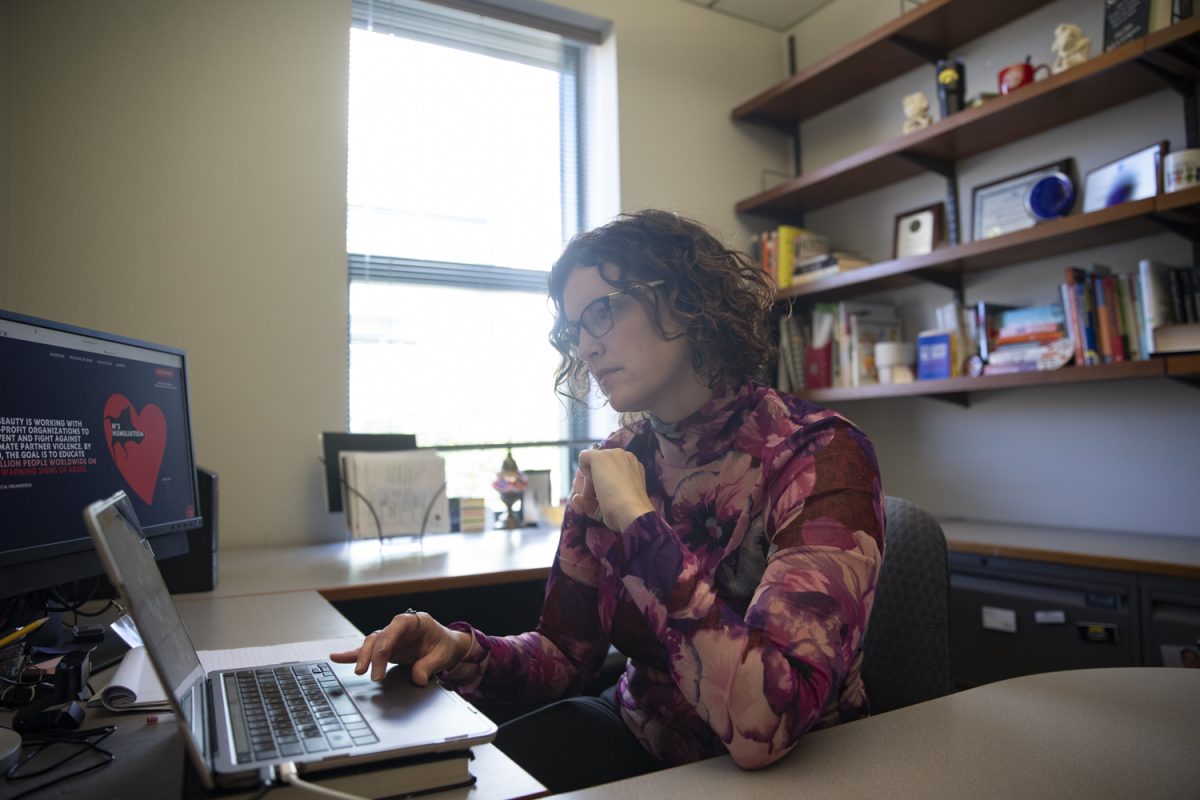Four years ago, a professor and researcher at the University of Iowa’s Tippie College of Business began working with a nonprofit program spawned from Yves Saint Laurent, a French fashion and beauty company, to identify warning signs and effects of domestic abuse — and how to handle them.
Beth Livingston, the researcher at Tippie, has since designed a training program called How to Love for those exact purposes that has now trained over 911,000 people to recognize the signs of abuse, according to the program’s website Abuse Is Not Love.
Tippie College of Business Dean Amy Kristof-Brown said, about Livingston’s work, that it is important to understand how to maintain a healthy work environment and promote the health of employees.
“The work that Dr. Livingston is doing is critical to allowing individuals to live and work at their fullest potential,” she said. “Understanding how managers and colleagues can intervene safely to provide support to a colleague undergoing trauma is not just compassionate, it’s good business.”
Abuse Is Not Love came from Yves Saint Laurent Beauty and has partnered with numerous national domestic abuse advocacy nonprofits around the world, such as the United States’ It’s On Us and the United Kingdom’s Women’s Aid programs.
Abuse Is Not Love identifies nine key warning signs, ranging from physical to psychological. According to the website, one in three women will experience “intimate partner violence” in their lifetime.
Yves Saint Laurent actively funds nonprofit programs to educate and raise awareness on these issues. However, in 2020, the company sought a new angle to their awareness and prevention program when they connected with Beth Livingston at the UI.
Livingston said her role with Abuse Is Not Love is providing both “thought leadership” and a particular skill set dedicated to evaluating the data on domestic abuse collected by the program.
“They [the programs] need people with the types of skills that I have to be able to figure out, are they solving the right problems?” she said. “Are the solutions they have come up with — are they effective? And I found it incredibly rewarding to be able to use my skills in that way.”
Livingston’s focus of research applies specifically to how the signs of domestic violence and abuse can be recognized in the workplace by coworkers and how it applies to management, a key area of her studies and curriculum at Tippie.
She said this perspective of domestic violence throughout the workplace is a result of the COVID-19 pandemic, which saw a majority of workers around the world switch to online, remote work for months. She said this allowed instances of abuse to occur with an audience — that being the victim’s coworkers and managers.
RELATED: New UI Center for Social Science Innovation
Livingston shared a story about a woman who was the victim of verbal abuse while attending a meeting over Zoom with her employer — an instance that the manager at the time was not able to process or handle. She said she based the training program’s design around data she helped analyze and that it is dedicated to making sure managers can take action faster in the future.
She said her research resulted in her writing an article for Harvard Business Review that holds managers accountable for these potentially life-altering issues happening in their employees’ lives.
“This research led me to write the article to say ‘Managers, you care about the holistic well-being of your employees,’” Livingston said. “We care about well-being, and this has to be part of the conversation. What are you going to do to provide support for them? You have the resources they need to to get help, to go to therapy, to get whatever it is that they need.”
Livingston said her research with Abuse Is Not Love is currently on pause, but she is looking forward to a project already planned to begin sometime in the near future.
In Iowa City, Domestic Violence Intervention Program Executive Director Kristie Fortmann-Doser said it is important to understand the significance of a workplace as a safe space.
“A work environment gives them a break from that environment, but it also gives them the opportunity to cultivate relationships and friendships that their partner may or may not be trying to control,” she said.
Fortmann-Doser said it is common for abusers to use manipulative tactics to control their partners, and that includes being present in that partner’s workplace to convince co-workers of their good intentions, even if there are none.
She said a quality, well-managed, and respectful workplace is achieved by and actively looks to help with ensuring the health and safety of its workers.
“Having an environment where not only does that survivor feel safe but having an environment where colleagues and managerial staff have an understanding of their community and have an appreciation and understanding of how domestic violence works can mean life or death,” Fortmann-Doser said.



